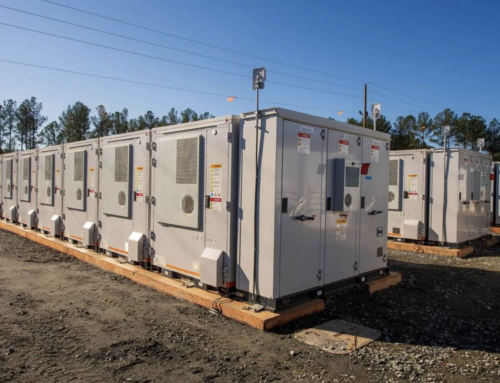This article, written by Craig Lesser and Jorge Fernandez of The Pendleton Group, appeared in Global Atlanta. Read the article on their site here. This white paper builds on a previous edition published by Insider Advantage.
Powering Ahead: How Georgia Can Become a Global Energy Thought Leader
Georgia is becoming known as a hotspot for energy technology investment. But the state can be more than an investment destination; it can become a global thought leader in energy policy, innovation and production.
Our private, public and academic communities are weaving a network of experts and actors who, together, have the capacity to position Georgia as an international energy center of excellence that hones intellectual thought, research, strategy and practical use to propel the global energy industry forward.
The creation of a new “Georgia Global Energy Policy Center” would capitalize on the state’s existing assets and activities and cooperate with international partners to drive global innovation – and action – around energy.
From significant international investments in electric vehicle production to international cooperation in clean energy technology, the state is already becoming a magnet for the latest and greatest ideas about how to efficiently and safely generate and use energy.
Our private sector – including many international companies – is pouring money and innovation into creating new energy technologies and new forms of energy production. Our state is taking full advantage of increasing investments in electric vehicles and battery technologies. Equally, our universities are teeming with new research to make energy generation, distribution and use more productive, cleaner and lower cost.
While Houston is the mecca for the fossil fuel industry, Georgia is creating an alternative energy ecosystem that, with input from international partners, is becoming a literal global powerhouse.
Let’s take it further. Let’s make Georgia the locus of global energy cooperation, innovation and policy.
A New Global Energy Policy Center
Building on Georgia’s existing energy-related activities in the private, public and academic sectors, the creation of a formal Georgia Global Energy Policy Center – funded by state government, private industry, federal grants and foundations – would exploit the expertise of the entire University System of Georgia.
The Georgia Institute of Technology could be the hub as the Center of Energy Supply Research. The University of Georgia, with its engineering and agricultural schools, could form the Center for Rural Energy Research and Policy. Georgia Southern University could house the Center of Air and Sea Energy Research and Policy, and Georgia State University could become the Center of Urban Energy Research and Policy.
Rather than only competing in numbers of jobs and inward investment, Georgia could compete on the value of its connections and intellectual capacity. The Georgia Global Energy Policy Center would connect the right global players to bring critical mass to address the most pressing energy issues of our time.
Georgia’s energy network could then form relationships with similar energy think tanks around the world to cooperate on investment, partnerships and further innovation.
Putting Energy Innovation into Action
International and domestic private sector companies in Georgia, if brought together by a statewide energy policy center, could further actualize innovation coming out of existing energy policy and research centers.
Georgia leaders such as AGCO, Delta Air Lines, Fieldale Farms, Georgia Power Co., Gulfstream, Hyundai, Kia, Lockheed, Mercedes Benz, Porsche, Southern Co. and dozens of others with interests in the energy space could utilize the new Georgia Global Energy Policy Center to build partnerships with university researchers that further their own energy projects. They could also cooperate on joint energy work to bring in additional international partners and funding.
Energy-related organizations like AEE, INPO and others could cooperate with the new policy center to pool resources and knowledge.
Georgia has a good head start on energy work. The existing Center of Innovation for Energy, led by the Georgia Department of Economic Development, is already working with companies like Stryten Energy, Mitsubishi Turbines and Siemens Energy and Automation to advance energy technologies for improved energy generation, storage and consumption.
This energy innovation center has been working with other partners for about 10 years to lay the groundwork for the electric vehicle (EV) mobility industry in Georgia. Building on its strong automotive cluster, Georgia has positioned itself as a hub for electric transportation, with 35 EV-related projects investing in the state since 2018.
Hyundai Motor Group’s fully dedicated EV and battery manufacturing “meta plant” facility near Savannah is expected to ramp up to full production in 2025. Rivian’s largest manufacturing facility in the U.S. is slated to start production in Georgia in 2026. Georgia is also rapidly expanding its full EV supply chain with related manufacturing
and solutions.
Other companies have followed suit. NVH Korea has announced a $72 million battery parts factory in Henry County, and Woory Industrial Co., Ltd., plans to open an EV parts R&D center and manufacturing facility in Dublin, Ga. Both are coming here to support the Hyundai Meta Plant, where LG Energy Solution Ltd. is partnering on its $4.3 billion battery operation.
Anovion Technologies is building an $800 million plant to manufacture synthetic graphite anode materials for lithium-ion batteries in Bainbridge, Ga.
Georgia’s ambitions to become a hub for clean vehicles underscores its desire to be a clearinghouse for expertise around clean energy in general, forging new paths in EV infrastructure, battery development and commercialization and charging stations.
Georgia’s existing energy innovation center is now focusing on identifying EV charging equipment manufacturers, such as Netherlands-based Heliox. The state is especially interested in enticing global players in hydrogen energy technology and storage to invest in Georgia.
Hydrogen expertise could buttress Georgia’s energy prowess. The state could work with Hydrogen Europe on innovation and investment for deploying hydrogen power. The Center of Innovation for Energy is hoping to put together demonstration hydrogen projects and potentially the first hydrogen living laboratory, similar to its work on the net-zero transportation initiative The Ray and the smart city Curiosity Lab.
Georgia is already bidding for funding to be a center for hydrogen expertise via a coalition of regional utilities, including Southern Company. Additionally, Georgia Power is conducting research into hydrogen fuels.
Related suppliers such as Atlanta Cylinders Inc., whose parent company is in the Czech Republic, are already lining up to support Georgia’s hydrogen endeavor. Automakers like Hyundai and Toyota Motor Corp. are looking to hydrogen as the fuel of the future.
If we are successful with hydrogen initiatives, the industry will start paying attention to Georgia, as the EV mobility industry did.
The state’s previous initiatives to coalesce expertise and business clusters around fintech and global health are evidence of Georgia’s ability to garner local and international support to boost certain industries.
These existing and future innovation centers in Georgia could contribute important resources to share with a new Georgia Global Energy Policy Center and forge new connections among international and local innovators and between those innovators and public and private sector actors.
Building Energy Leadership Today and Tomorrow
The creation of a Georgia Global Energy Policy Center would encourage public education programs around new energy technology. With educational and community programs in place to engage children in learning about better ways to create and use energy, Georgia can cultivate energy-minded students to feed our universities and technical schools – which would, in turn, develop new programs focused on the energy sector – and build leaders who will direct our world’s energy future.
With a growing community of educated professionals, Georgia can further its reputation as the best place for smart, motivated individuals to come to learn about and put into practice new energy technologies, attracting talented entrepreneurs and innovators from around the world.
Georgia’s startup ecosystem could benefit from – and contribute to – new energy development. The Georgia Research Alliance has been instrumental in accelerating the growth of university research and development in the state. By bringing private and public research investment to Georgia, the GRA supports startup companies and creates jobs. GRA’s efforts, aligned with those of a new energy policy center, could result in even further economic impact throughout the state.
The Georgia Global Energy Policy Center would be a nonpartisan effort that benefits the entire state. The energy challenges of today – and tomorrow – face us all. The issues are global and personal at the same time. Research and development on this scale can only benefit every Georgian, whether by creating new jobs or inventing new efficiencies that impact gas and electric bills.
With a new Georgia Global Energy Policy Center, we can pool our private, public and community resources to make our state the nexus of international energy thought and action – to power the future.










